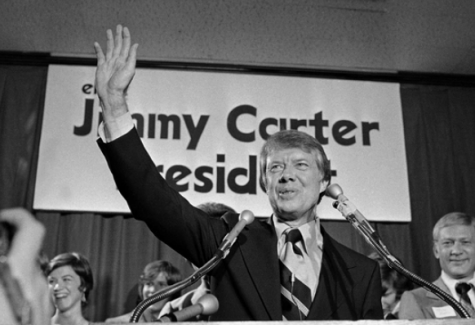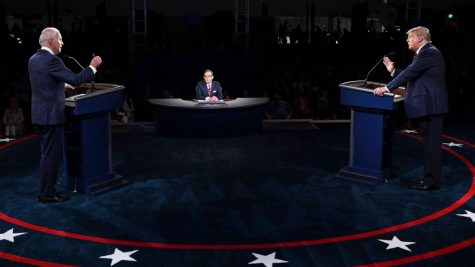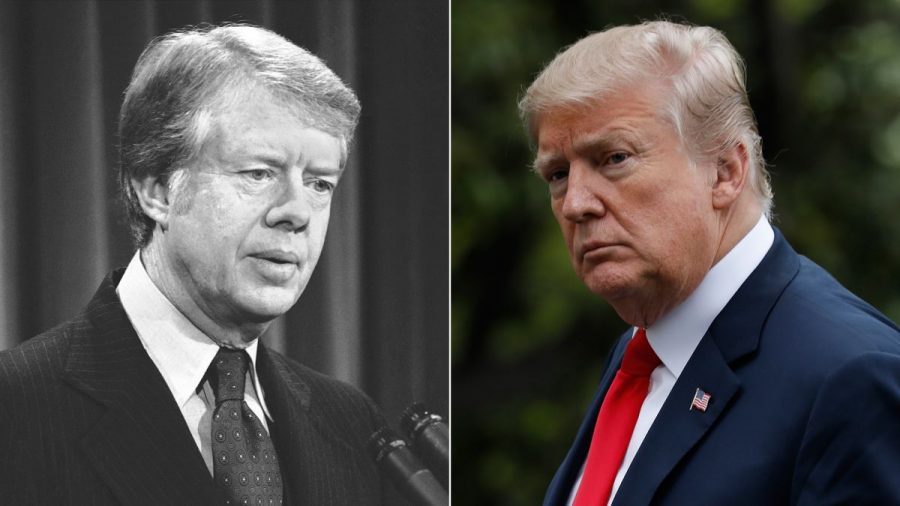Is Trump the New Carter?
Is Donald Trump destined to be the next Jimmy Carter? Will he be a one-term president whose failures weaken him to the point that previously loyal voters abandon his party leading to a landslide victory for the challenger?
First, a little history. The year was 1980; Dallas topped the primetime television rankings, the Rubik’s Cube had just been released, and the President — he was Jimmy Carter. America was embattled; the Iranian Hostage Crisis was pushing its second year, the economy had taken a beating, and a narrowly-elected outsider incumbent once more faced an uphill battle. Over his first term in office, Carter lost much of the support of his base, alienating Democratic party leaders and voters alike. Much of the blame for the States’ economic and diplomatic blunders was attributed to poor leadership on the part of Pres. Carter, particularly his inability to solve the energy and Iran hostage crises that hobbled his administration. Out of this environment of mass dissolution and unrest came an established, charismatic challenger: Ronald Reagan.
 He presented a shiny alternative to Carter’s anxious and ultimately lackluster governance. Not solely by popularity of conservative policy, but by personal charm and wit, Reagan posed a serious threat to a second Carter term. Of course, he managed to gain a secure grip on the Republican party’s base of voters. However, the most fascinating and influential gains of the Reagan-Bush Campaign were those made across the partisan aisle. By appealing to the very same Democrats who felt as though the trajectory of the party had departed from their beliefs, Reagan attained serious traction with alienated liberals. This cross-party appeal resulted in the formation of a broad, powerful coalition in the leadup to the election and the short-lived political group known as Reagan Democrats.
He presented a shiny alternative to Carter’s anxious and ultimately lackluster governance. Not solely by popularity of conservative policy, but by personal charm and wit, Reagan posed a serious threat to a second Carter term. Of course, he managed to gain a secure grip on the Republican party’s base of voters. However, the most fascinating and influential gains of the Reagan-Bush Campaign were those made across the partisan aisle. By appealing to the very same Democrats who felt as though the trajectory of the party had departed from their beliefs, Reagan attained serious traction with alienated liberals. This cross-party appeal resulted in the formation of a broad, powerful coalition in the leadup to the election and the short-lived political group known as Reagan Democrats.
How about today? The year’s 2020; television news is more akin to football coverage than solemn journalism, hundreds of thousands are dying of a staggeringly politicized pandemic, and the President — he’s a former reality TV star turned “radically conservative” poster child for the right, Donald Trump.
At first blush, Trump’s reelection bid is looking quite familiar, harkening back to Carter’s 1980 defeat. After years of a soaring financial sector, the Trump administration had to defend a sloppy pandemic response, one which has claimed the lives of nearly 200,000 Americans, brought the country’s Q2 GDP down roughly 30% over the previous segment, and has continued to leave nearly 8% of the population unemployed (as of early September). Meanwhile, as was the case with Carter, many within Trump’s own party feel that their values no longer align with those which the President has imposed on postmodern Republicanism. For some, the party no longer represents the same principles of traditional conservative government it purportedly embodied during the days of Reagan or Bush but, instead, a brash, unpredictable bastion for radical ideology. In response to this, many prominent Republican figures such as Sec. Colin Powell and John Kasich have extended their support to the Joe Biden Campaign. Organizations like The Lincoln Project are also working to stir up bipartisan support for Biden mostly on the grounds of an asserted moral superiority.
 One would think that the favor of such individuals would be indicative of widespread discontent with Trump’s performance among Republican voters. However, polling information appears to indicate otherwise. According to Pew Research, while only an average of 57% of Democrats approved of Carter during his presidency, an average of 87% of Republicans have approved of Trump. It’s here that the argument of a Reagan-like Biden appeal is brought down to Earth.
One would think that the favor of such individuals would be indicative of widespread discontent with Trump’s performance among Republican voters. However, polling information appears to indicate otherwise. According to Pew Research, while only an average of 57% of Democrats approved of Carter during his presidency, an average of 87% of Republicans have approved of Trump. It’s here that the argument of a Reagan-like Biden appeal is brought down to Earth.
On the surface, the circumstances facing both Carter and Trump may seem similar. Nevertheless, these disparate responses have a logical explanation: whereas the former lost his party base, the latter changed his. Carter was an outsider from the get-go. Nobody anticipated a success; the same is true for Trump’s 2016 victory. Carter clung to the dwindling, barely majority support he managed to win over four years prior. Trump, on the other hand, redefined Republicanism. Through divisive, frequently repugnant rhetoric that bashed the ideals of orthodox American conservatism, he managed to expose an untapped well of voters while simultaneously drawing out masked racists and xenophobes who had previously been disenchanted by the Republican party’s perceived elitism and globalism. The reason some Republican leaders have voiced support for Biden is because the party no longer reflects their values. That said, the party’s altered base of voters still supports Trump.
It is said that history repeats itself. Indeed, on the surface many might expect Biden to crush Trump in a landslide fueled by a cross-party coalition of voters, echoing the Reagan-Carter election of 1980. However, upon further research and reflection, it appears that Democrats must be extremely cautious to not rely on Republicans joining their ranks come November. The path to victory for Biden may lie more in turning out his own base of supporters rather than poaching Trump’s. In the end, the race will likely not be a landslide as it was 40 years ago. It will be closely and bitterly fought. All we can hope for is that our country emerges still capable of putting itself back together after one of the most polarizing and divisive election seasons in history.

Lorenzo Ruiz, a senior, is a Coeditor-in-Chief. An enthusiast of government and current events, his hobbies include debate, Academic WorldQuest, Model...

